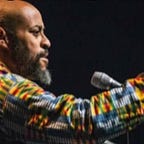The Meaning of Kwanzaa, an African American cultural observance
From what the living books called our Elders tell us, the Civil Rights Movement represents something intangible, just outside the intellectual grasp.
It is more than dates and events and personalities. "It" wasn’t the speeches or the marches. "It" was what made the speeches and marches necessary. The Civil Rights Movement was a movement; an experience; an internalization of the intangible.
The series of seven holy days we call Kwanzaa in 2021 originated from a FEELING; a need to perpetuate a certain level of self-esteem. Let me explain, while Dr. King is living out the events dramatized in the “Selma” movie, Minister Malcolm X is assassinated on Feb. 21, 1965. The heart of 22 million Negroes broke.
Here is why: American historians explain The Civil Rights Movement as the second independent act of the “people”created by chattel slavery (1680 - 1866). Almost 4 million persons of mixed African, Native and European blood were "released" from the physical bondage of white supremacy on Dec. 6, 1865, with the ratification of the 13th Amendment.
American historians label the first independent act of Negro people without having to consult white citizens as, The Great Migration. Said act was in response to the Hollywood blockbuster, “Birth of A Nation,” which taught White America how to lynch Negroes. Rather than remain and be lynched, a population (in 1915) of 10 million Negroes choose fleeing to Chicago, New York and California.
Unfortunately for my grandparents, life in the North and the West was rife with a more cerebral form of segregation, enforced through clever salesmanship and real estate. American historians call this practice by white segregationists as "redlining." The Civil Rights Movement represented a collective decision to choose to stop running and assist White America in growing up.
As the theme music for PBS’s award-winning documentary, ‘Eyes on the Prize,’ says, “The one thing we did right was the day we started to fight!” A new consciousness was born in the crucible of the 381 day contest of wills American historians call, The Montgomery Bus Boycott. Dr. King articulated a level of self-esteem those who looked like him had not yet attained in eight generations.
“We are human beings,” 22 million Negroes appeared to be saying in 1956. “We refuse to be complicit in our own oppression. We will not agree with White America and willingly practice segregation. We will not agree with White America that we deserve to sit in the back of the bus or live in slumlord housing or attend college classes by standing outside the door because we cannot sit in the same classroom as white students. We wish to be treated by White people the same way White people choose to treat their fellow White people. We want White America to treat us as human beings; not as farm animals.”
Specifically, The Women's Political Council (founded in 1946) had a set of demands for Montgomery Mayor "Tacky" Gale. Those demands sat before him through the complaints of 15 year old Claudette Colvin and 18 year old Mary Louise Smith in 1955 concerning treatment of Negroes on Montgomery Buses. When Rosa Parks stepped up to become the pivot of the paradigm-shift to resist segregation, WPC President Jo Ann Robinson knew exactly how to organize the community.
Parks' emergence from the Montgomery jail unscathed galvanized the collective mind of 50,000 Montgomery Negroes. Segregation demanded every infraction come with immediate punishment. Mother Parks being untouched was internalized as the result of divine intervention. She had a certain "protection."
A leadership council was quickly formed. President Robinson designed a flier, outlining a one day boycott, and the young preachers distributed the flier within the community. The local media was fed strategic information and "leaked" the boycott for the Sunday paper.
The next day, the buses were empty.
Eight generations; it took eight generations before the Africans brought to the United States through the Trans-Atlantic slave trade developed the self-esteem to demand - and enforce - treatment by white Americans as human beings.
A bespectacled scholar named Maulana Karenga decided to use Minister Malcolm’s assassination in 1965 to institutionalize the new self-esteem the Civil Rights Movement created.
"Cultural nationalism" among 22 million Negroes was born in 1965 and, slowly, Negroes chose to become “Black.”
What does cultural nationalism mean? It means, the Negro History week my Mother grew up celebrating in a Denver, Colorado segregated high school evolved into my observance of Black History Month in 1992, inside the most multicultural high school in the United States.
It means, the first Black man elected President wore an African name, first and last; neither one given eight generations ago by George Washington.
It means Miss America in 2019, who was Black, proudly wearing her hair the way it naturally comes out of her head.
It means, Kwanzaa is celebrated in December, not after Thanksgiving, which is a harvest/Fall holiday, because of Mother Rosa Parks' act of courage.
Culture is more than song and dance; it is meaning making and identity. Today, 38 - 42 million African Americans enjoy many of the fruits of the Civil Rights Movement. If you are a member of the Black community in Lane County, you are invited to experience Kwanzaa and learn HOW African American culture WORKS.
The first day of Kwanzaa, or Umoja, is being observed, locally, through ZOOM meetings from Sunday, Dec. 26 until Saturday, Jan. 1, 2022.
For more information please contact Kokayi Nosakhere at royalstar907@gmail.com.
#EugeneKWANZAA2021
